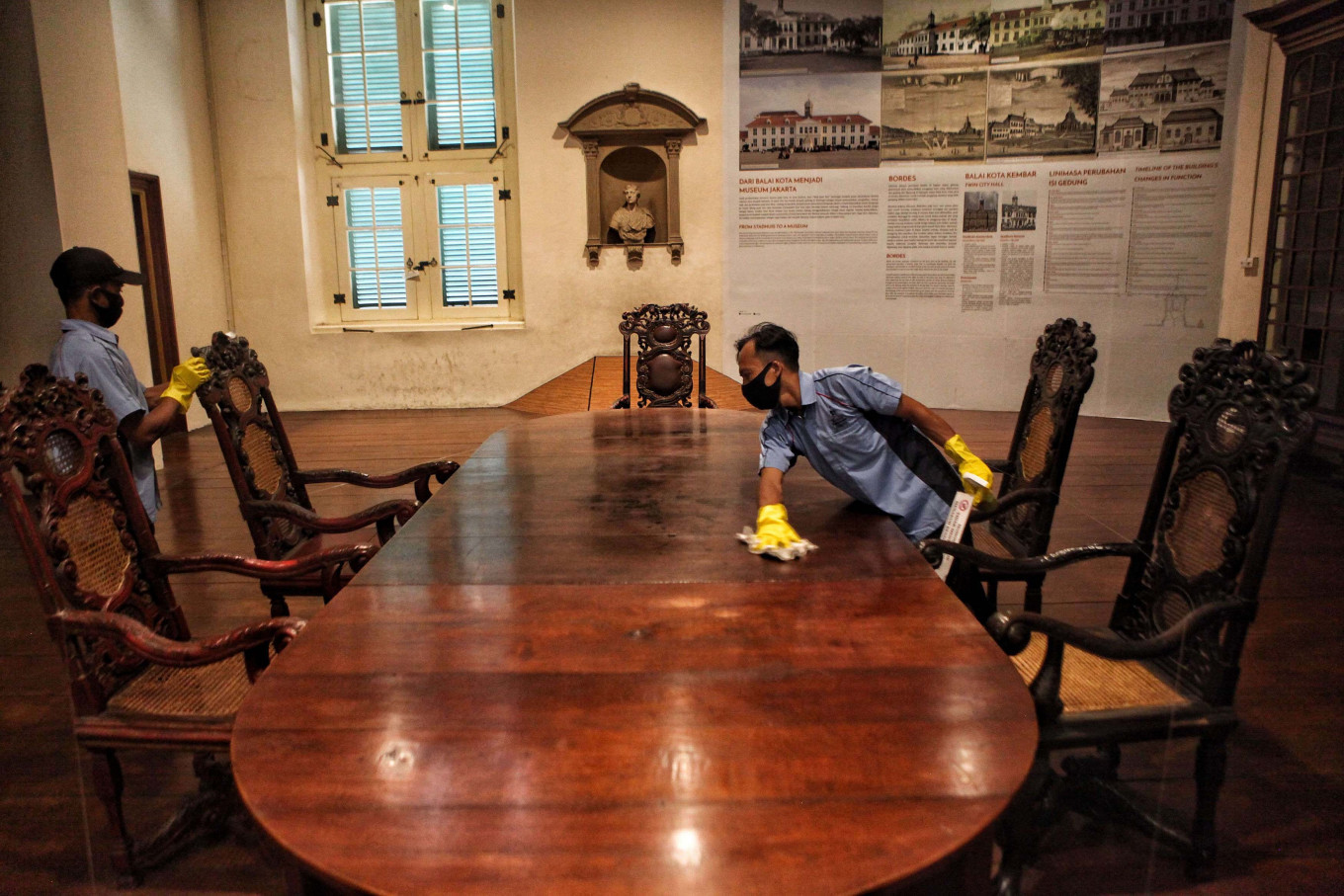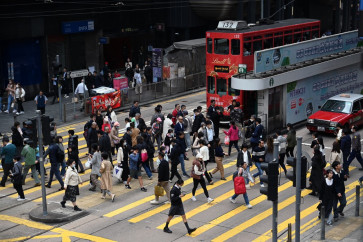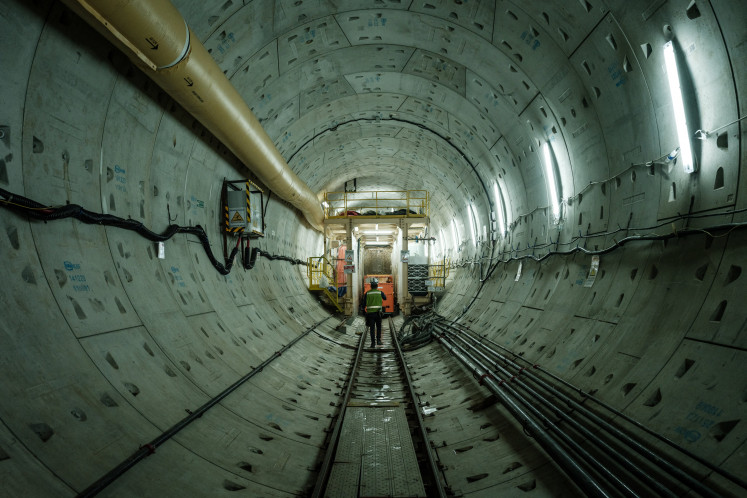‘Transitional PSBB’: A deciding chapter for Jakarta’s new normal
During the easing period, Jakarta is gradually opening places of worship, workplaces, public places, public transportation and educational institutions, but still requires health protocols in those sectors.
Change Size
 Officials clean an art collection at the Jakarta History Museum, also known as Fatahilah Museum in Jakarta on June 6, 2020. The Jakarta administration allowed a number of tourist attractions such as museums to reopen on June 8, after three months of closure during the large-scale social restrictions (PSBB) period. (JP/Seto Wardhana)
Officials clean an art collection at the Jakarta History Museum, also known as Fatahilah Museum in Jakarta on June 6, 2020. The Jakarta administration allowed a number of tourist attractions such as museums to reopen on June 8, after three months of closure during the large-scale social restrictions (PSBB) period. (JP/Seto Wardhana)
L
ess than a month since the central government’s first call to “co-exist” with the coronavirus, Jakarta is among the first provinces in Indonesia to ease restrictions and begin the transition to the new normal.
Governor Anies Baswdan said the move to ease large-scale social restrictions (PSBB) was necessary as the capital was suffering from an economic downturn. It experienced an unprecedented 45 percent fall in tax revenue, leading to drastic cuts in spending.
Anies extended the PSBB, also known as a partial lockdown, for the third time, on June 4, announcing that the month would be Jakarta’s “transition” period, after research data showed that the epidemiological trend of news cases and deaths had declined.
The transitional PSBB period will serve as an early chapter of Jakarta’s new normal that Anies said would only apply to strategic sectors with manageable risks, in line with Jokowi’s directive to reopen the economy carefully and gradually.
The Jakarta administration also vowed to push stronger enforcement and public compliance.
How relaxed are the transitional PSBB?
The central government has issued a health ministerial decree regarding the new normal guidelines which mandate new health protocols both during and after the PSBB period.
To detail the protocols for Jakarta reopening, Anies has issued Gubernatorial Regulation No. 51/2020 on the implementation of the transitional PSBB. The Banten administration has also issued a similar regulation.
During the easing period, Jakarta is gradually opening places of worship, workplaces, public places, public transportation and educational institutions, but still requires health protocols in those sectors.
Some of the health measures are adapted from PSBB regulations and the common health standards such as maintaining 1 meter distance between each other, avoiding gatherings and wearing a face mask in public places.
Other measures, specifically those for businesses, are adapted from the health ministerial decree on the new normal, including the order to apply proper sanitation and the formation of a COVID-19 handling team in workplaces.
Read also: Health minister issues ‘new normal’ guidelines for workplaces
The most significant feature in the transitional PSBB is the limitation of visitors or workers to 50 percent applied to all reopened sectors. Exceptions are only made for private vehicles — with passengers listed on the same family card — and motorcycle taxis, which are allowed to operate at full capacity.
Businesses that record new confirmed or suspected cases in their workplaces are required to stop operations for at least 24 hours and conduct a disinfection process. Managements are not allowed to lay off workers who are under self-isolation or quarantine.
During the transition period, the regulation says all roads should be prioritized for pedestrians and cyclists for their daily mobility. The city will also carry out parking control on off-street spaces through parking space limits.
In places of worship, the transition period requires disinfection of floors, walls and building equipment before and after each worship activity. Every worshipper is required to bring his or her own worship equipment.
Sanctions against PSBB violations in the earlier regulation remain in place, including community service in the form of public sanitation duty or a fine of Rp 250,000 (US$17.84) for those caught not wearing a mask in public.
Stages of reopening
The Jakarta administration has prepared two stages for the transitional PSBB, which is stipulated in Gubernatorial Decree No. 563/2020. The first stage targets businesses, houses of worship, social and cultural activities and mobility of vehicles.
An “emergency brake policy” will also be in place to stop the reopening of those sectors if the number of cases surges. By the end of June, the city will consider whether it is feasible to proceed to the second stage, which includes the reopening of schools.
The transitional PSBB applies to most, but not all areas. Out of about 2,700 community units in Jakarta, there are 66 reportedly still in the “red zone” for virus transmission, and therefore excluded from the easing period.
“For the red zones, I hope the mayors and regents can lead in controlling transmission. [...] If the previous control was more at the provincial level, now we are starting to work at the city and regency level,” Anies said during a recent internal meeting.
The transitional PSBB regulation also stipulates that areas that fail the transitional phase will be asked to return to implementing the original PSBB, with strict restrictions and control carried out locally.
Concerns over congestion due to higher people mobility
With the half capacity policy also applied to public transportation, the increased likelihood of traffic congestion and passenger buildup during and after the easing period has sparked concern among transportation experts.
COVID-19 national task force chief Doni Monardo claimed during his monitoring on Monday morning that commuter compliance with health protocols had improved, but packed bus and railway stations could be found throughout Greater Jakarta.
“The underlying matter is not the public adherence to health protocols, but more the capacity of mass public transportation modes to guarantee physical distancing, especially during rush hour,” Djoko Setijowarno from the Indonesian Transportation Society (MTI) told The Jakarta Post on Friday.
PT Kereta Commuter Indonesia (KCI) has begun operating 935 trips per day, an increase of 161 from the number of trips during the previous PSBB period. However, as a state-owned train operator, it has followed the Transportation Ministry’s 35 to 40 percent capacity instead of Jakarta’s half capacity policy.
Djoko said if businesses run at the same pace as before the pandemic, the capacity of mass public transportation in Greater Jakarta would not be enough to accommodate proper physical distancing.
In the transitional PSBB regulation, Anies requires businesses to build systems that regulate the distribution of working days, working hours and work shifts.
Jakarta is also considering reinstating the odd-even license plate policy, which has been stopped since March 15.
Djoko said traffic congestion might be even worse than before the pandemic because more people would avoid using public transportation for fear of infection and therefore, reinstating the traffic policy might lead to chaos if the government is unable to provide adequate public transportation with physical distancing.
“What is rational now is to control public activities in the new normal period with manageable intensity,” he said, adding that businesses should still apply a work-from-home policy.
Institute for Transportation and Development Policy (ITDP) Southeast Asia director Faela Sufa recommended that businesses arrange their own safety policies for the new normal, such as telecommuting, as well as working schedule division and shuttle buses for employees.
“During the time of crisis, emergency vehicles or medical and logistics vehicles and key workers must receive priority. Therefore, allowing the transition of mobility to private vehicles that will definitely cause more traffic is not an option,” she said.









